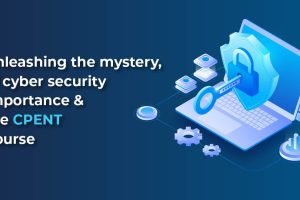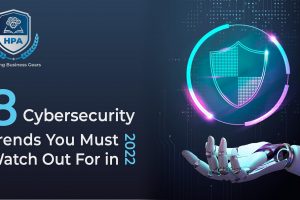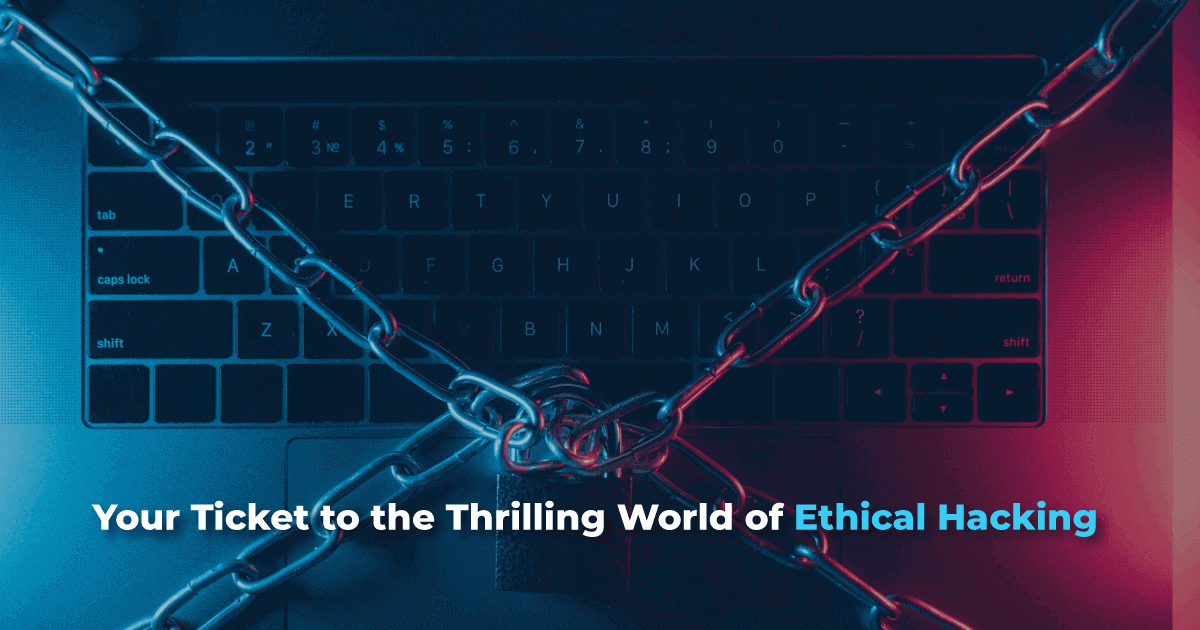
CEH: Your Ticket to the Thrilling World of Ethical Hacking
Why do we need ethical hacking? _A news release stated that on March 18, a massive cyberattack occurred on the infrastructure of Henry County, Iowa. According to the announcement, the attack targeted the county’s Computer Aided Dispatch and Records Management System.
The public safety radio network and the 9-1-1 phone service remained operational, even though the systems are essential to the day-to-day operations of public safety organizations in Henry County. The cyber response team has made little but significant strides in safely resuming system operations. The Henry County Courthouse’s computers were down this week, according to the Quad-City Times.
Restoring the affected systems to service is an ongoing task for the Henry County Cyber Response Team. While the repairs are being done, there isn’t thought to be any hazard to public safety. Nothing was brought outside of the county’s internal network or compromised, according to the cyber response team for the county.
Despite this, officials said that community members who may have been impacted should still watch out for suspicious activity on their credit reports or financial accounts.
Any resident who has recently interacted with a public safety agency in Henry County is deemed to be “at risk”. It is recommended that you get in touch with their bank and police enforcement if you see any unusual activity. This is what is happening on a daily basis now and there is a great need for Ethical Hacking and Cyber Security.
Table of Content
- What is the Ethical Hacking?
- Who are the Ethical Hackers?
- What is an Ethical Hacking course?
- What are the accredited certificates in the field of ethical hacking?
- What is the CEH certification?
- What is the difference between CEH certification and Certified Ethical Hacker v12
- FAQ
What is the Ethical Hacking?
-
Ethical hacking:
also known as penetration testing or white hat hacking, refers to the practice of testing computer systems, networks, or applications for vulnerabilities or weaknesses in a manner that is authorized and legal. Ethical hackers simulate the actions of malicious attackers to identify potential security risks and help organizations strengthen their security defenses.
-
The primary goal of ethical hacking:
is to proactively identify and address security weaknesses before they can be exploited by malicious actors. Ethical hackers use a variety of tools and techniques to assess the security posture of a system, including network scanning, vulnerability assessment, social engineering, and penetration testing.
-
Ethical hacking plays a crucial role:
in helping organizations protect their sensitive information, intellectual property, and customer data from cyber threats. By identifying and addressing security vulnerabilities, ethical hackers help organizations minimize the risk of data breaches, financial losses, and reputational damage.
-
It’s important to note that ethical hacking:
must be conducted within a legal and ethical framework, with proper authorization from the organization being tested. Unauthorized hacking, or hacking with malicious intent, is illegal and unethical and can result in serious legal consequences. Ethical hackers are bound by codes of conduct and professional standards to ensure that their activities are conducted responsibly and ethically.

Who are the Ethical Hackers?
- Ethical hackers, also known as white-hat hackers or penetration testers, are individuals who possess the technical skills and knowledge to identify and exploit security vulnerabilities in computer systems, networks, or applications, but they use these skills for constructive purposes within a legal and ethical framework. Ethical hackers typically work within organizations or as independent consultants to assess and improve the security posture of systems and networks.
- Ethical hackers come from diverse backgrounds, including computer science, information technology, cybersecurity, and related fields. They often have a deep understanding of computer systems, networking protocols, programming languages, and security principles. Many ethical hackers hold certifications such as Certified Ethical Hacker (CEH), Offensive Security Certified Professional (OSCP), or GIAC Penetration Tester (GPEN) to demonstrate their expertise in ethical hacking and penetration testing.
- Ethical hackers play a critical role in helping organizations identify and mitigate security risks before they can be exploited by malicious attackers. They conduct comprehensive security assessments, including vulnerability scanning, penetration testing, and social engineering, to identify weaknesses in systems and networks. Ethical hackers then provide recommendations for remediation and work with organizations to strengthen their security defenses.
- In addition to technical skills, ethical hackers must adhere to strict ethical guidelines and legal requirements when conducting security assessments. They must obtain proper authorization from the organization before conducting any testing and ensure that their activities do not cause harm or disruption to systems or networks. Ethical hackers are committed to upholding professional standards and promoting cybersecurity best practices to protect organizations from cyber threats.

OK, what is an Ethical Hacking course?
An Ethical Hacker course is a structured educational program designed to provide individuals with the knowledge, skills, and practical experience needed to become proficient in ethical hacking and penetration testing. These courses are typically offered by educational institutions, cybersecurity training organizations, and online learning platforms.
An Ethical Hacking course typically covers a wide range of topics related to cybersecurity and ethical hacking, including:
- Introduction to ethical hacking: An overview of ethical hacking concepts, principles, and methodologies.
- Information security fundamentals: Understanding the fundamentals of information security, including confidentiality, integrity, and availability.
- Networking concepts: Understanding networking protocols, architectures, and technologies, including TCP/IP, DNS, DHCP, and routing.
- Operating systems: Understanding the security features and vulnerabilities of popular operating systems such as Windows, Linux, and macOS.
- Vulnerability assessment: Learning how to identify and assess security vulnerabilities in systems, networks, and applications.
- Penetration testing: Learning how to simulate cyber-attacks to identify and exploit security weaknesses in a controlled environment.
- Web application security: Understanding common vulnerabilities and best practices for securing web applications, such as SQL injection, cross-site scripting (XSS), and session management.
- Wireless security: Understanding the security risks associated with wireless networks and learning how to secure Wi-Fi networks.
- Cryptography: Understanding cryptographic algorithms, protocols, and techniques for securing data and communications.
- Social engineering: Learning and studying how to manipulate human behavior to gain unauthorized access to systems or information.
Ethical Hacker courses may vary in duration, format, and depth of coverage depending on the provider.
Overall, an Ethical Hacker course provides individuals with the knowledge, skills, and practical experience needed to identify and mitigate security risks effectively and ethically in today’s complex cybersecurity landscape.
If you need an accredited certificate, what are the accredited certificates in the field of ethical hacking?
In the field of ethical hacking, several accredited certifications are recognized and respected within the industry. These certifications validate an individual’s knowledge, skills, and proficiency in ethical hacking, penetration testing, and related cybersecurity domains.
Some of the most widely recognized accredited certifications in ethical hacking include:
1- Certified Ethical Hacker (CEH):
Offered by the EC-Council, the CEH certification is one of the most popular and widely recognized certifications in ethical hacking. It covers a comprehensive range of topics, including ethical hacking techniques, penetration testing, vulnerability assessment, and countermeasures.
2- Offensive Security Certified Professional (OSCP):
Offered by Offensive Security, the OSCP certification is highly regarded in the cybersecurity community. It requires candidates to pass a hands-on, 24-hour practical exam where they must demonstrate their ability to exploit vulnerabilities and gain access to systems in a controlled environment.
3- Certified Information Systems Security Professional (CISSP):
Offered by (ISC)², the CISSP certification is a globally recognized credential for cybersecurity professionals. While it covers a broad range of cybersecurity topics, it includes content related to ethical hacking, penetration testing, and security assessment methodologies.
4- GIAC Penetration Tester (GPEN):
Offered by the Global Information Assurance Certification (GIAC), the GPEN certification validates the skills and knowledge of professionals in conducting penetration tests and security assessments. It covers topics such as reconnaissance, scanning, exploitation, and post-exploitation techniques.
5- Certified Penetration Testing Consultant (CPTC):
Offered by the Information Assurance Certification Review Board (IACRB), the CPTC certification is designed for professionals who perform penetration testing as part of their job role. It assesses candidates’ ability to conduct penetration tests and provides actionable recommendations for improving security posture.
6- CompTIA PenTest+:
Offered by CompTIA, the PenTest+ certification is designed for cybersecurity professionals who perform penetration testing and vulnerability assessment tasks. It covers a wide range of topics, including planning and scoping, information gathering, vulnerability identification, and exploitation techniques.
These are just a few examples of accredited certifications in the field of ethical hacking. Depending on your career goals, interests, and level of experience, you may choose to pursue one or more of these certifications to enhance your credentials and advance your career in cybersecurity.
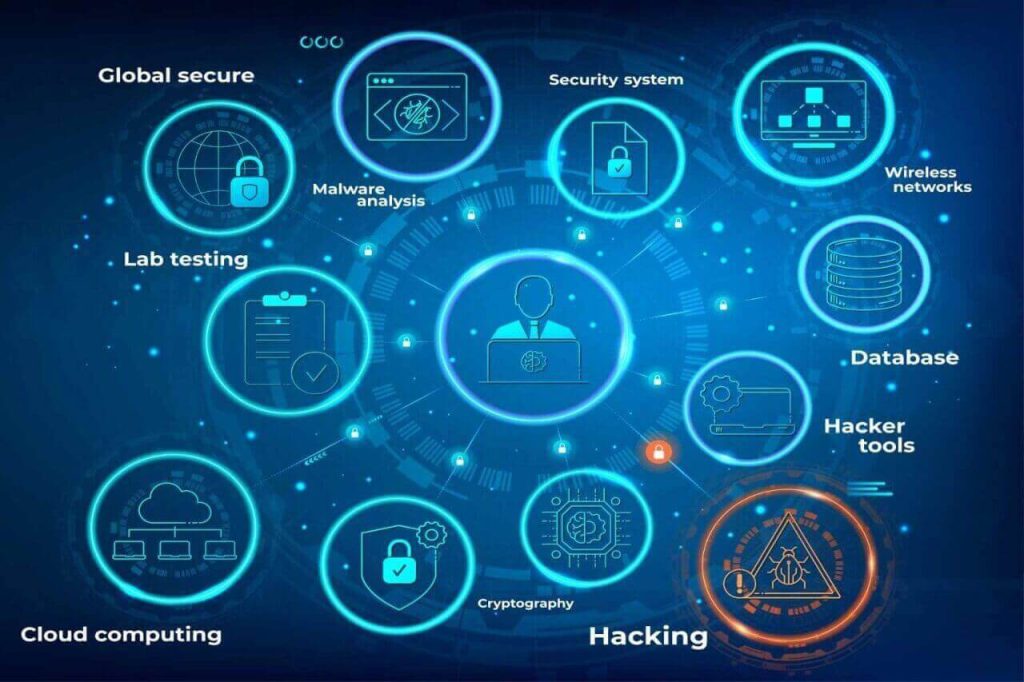
After we know what are the accredited courses and certificates in the field of Ethical Hacking, what is the CEH certification?
The CEH certification stands for Certified Ethical Hacker. The International Council of E-Commerce Consultants (EC-Council) provides this professional qualification. The CEH certification is designed to validate the skills and knowledge of individuals in the field of ethical hacking and penetration testing.
Key details about the CEH certification are as follows:
- Purpose: The primary purpose of the CEH certification is to certify individuals who possess the skills and knowledge to identify, assess, and mitigate security vulnerabilities in computer systems, networks, and applications. CEH-certified professionals are trained to think and act like malicious hackers in order to proactively defend against cyber threats.
- Curriculum: The CEH certification exam covers a wide range of topics related to ethical hacking, including reconnaissance, scanning, enumeration, system hacking, network exploitation, web application penetration testing, wireless network security, cryptography, and social engineering. The curriculum is regularly updated to reflect the latest trends and techniques in cybersecurity.
- Exam Format: The CEH certification exam consists of multiple-choice questions and requires candidates to demonstrate their understanding of ethical hacking concepts, tools, and techniques. The exam is typically proctored and may be taken at designated testing centers or online.
- Prerequisites: While there are no strict prerequisites for taking the CEH certification exam, EC-Council recommends that candidates have at least two years of work experience in the information security domain and undergo official training through an accredited training provider. However, candidates can also opt to self-study and then take the exam.
- Renewal: CEH certification holders are required to renew their certification every three years to ensure that their skills and knowledge remain current and relevant. Renewal can be achieved by earning continuing education credits through activities such as training, conferences, and research, or by retaking the CEH exam.
- Recognition: The CEH certification is widely recognized and respected in the cybersecurity industry. It is often sought after by individuals seeking to pursue careers as ethical hackers, penetration testers, security analysts, and cybersecurity consultants.
Overall, the CEH certification is a valuable credential for individuals looking to validate their expertise in ethical hacking and penetration testing and advance their careers in cybersecurity.
OK, What is the difference between CEH certification and Certified Ethical Hacker v12?
The “Certified Ethical Hacker” (CEH) certification and “Certified Ethical Hacker v12” are essentially the same certification, with the “v12” denoting the version of the CEH program. The “v12” designation signifies the 12th version release of the CEH certification program, which indicates updates, revisions, and improvements made to the certification curriculum, exam content, and training materials.
Here’s a breakdown of the differences between the CEH certification and Certified Ethical Hacker v12:
CEH Certification: This is the general term referring to the Certified Ethical Hacker certification offered by the International Council of E-Commerce Consultants (EC-Council). The CEH certification validates an individual’s skills and knowledge in ethical hacking, penetration testing, and related cybersecurity domains. The certification has evolved over time through various versions, each incorporating updates and enhancements to reflect changes in the cybersecurity landscape.
Certified Ethical Hacker v12: The “v12” designation specifically refers to the 12th version release of the CEH certification program. With each new version release, EC-Council typically updates the curriculum, exam content, and training materials to ensure they align with the latest industry trends, technologies, and best practices. The “v12” version may introduce new topics, tools, techniques, or methodologies relevant to ethical hacking and penetration testing.
In summary, while the “Certified Ethical Hacker” (CEH) certification is a general term referring to the certification program, “Certified Ethical Hacker v12” specifically denotes the 12th version release of the CEH program, indicating the most recent updates and revisions to the certification curriculum and exam content.
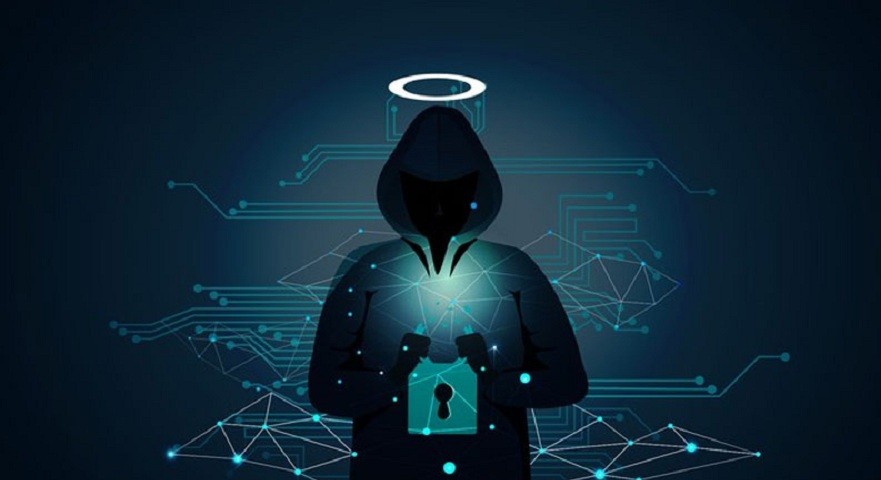
FAQ
1- What does an ethical hacker do?
- Identifies security vulnerabilities in computer systems, networks, or applications.
- Utilizes hacking techniques and tools to simulate attacks on systems.
- Conducts penetration tests to assess the effectiveness of security defenses.
- Provides recommendations for mitigating identified vulnerabilities.
- Helps organizations improve their overall cybersecurity posture.
- Works within legal and ethical boundaries, with proper authorization.
- Collaborates with organizations to protect sensitive information and prevent cyber threats.
- Adheres to professional standards and codes of conduct.
2- Are ethical hacking legal?
Yes, ethical hackers operate within legal boundaries when they have proper authorization to test and assess the security of computer systems, networks, or applications. They follow ethical guidelines, obtain consent from the organization being tested, and adhere to relevant laws and regulations. Ethical hacking is conducted for constructive purposes, helping organizations identify and mitigate security vulnerabilities to prevent cyber threats. Unauthorized hacking or hacking without permission is illegal and unethical.
3- Does ethical hacking require coding?
Ethical hacking can involve coding, but it’s not always a strict requirement.
Some aspects of ethical hacking, such as writing custom scripts or developing exploits, may require knowledge of programming languages like Python, Bash scripting, or PowerShell. Understanding coding concepts can also be beneficial for analyzing vulnerabilities, automating tasks, or developing tools to aid in the ethical hacking process.
However, not all ethical hacking tasks necessitate coding skills. Many activities within ethical hacking, such as network reconnaissance, vulnerability scanning, and social engineering, can be accomplished using existing tools and techniques without extensive programming knowledge.
While coding skills can enhance an ethical hacker’s capabilities and efficiency, they are not mandatory for all aspects of ethical hacking. It ultimately depends on the specific tasks, objectives, and methodologies involved in the ethical hacking engagement.
4- What are the 3 types of hackers?
- White-Hat Hackers: Ethical hackers who use their skills to identify and fix security vulnerabilities, often employed by organizations to strengthen their cybersecurity defenses.
- Black-Hat Hackers: Malicious hackers who exploit security vulnerabilities for personal gain, such as stealing data, causing damage, or committing cybercrimes.
- Grey-Hat Hackers: Individuals who may operate in a morally ambiguous manner, sometimes breaking the law or engaging in unauthorized activities, but without malicious intent. They may disclose vulnerabilities publicly or for personal recognition.
5- Do ethical hackers get rich?
ethical hackers can earn competitive salaries and lucrative rewards for their skills and expertise, particularly in high-demand industries such as cybersecurity. While becoming wealthy solely from ethical hacking might be uncommon, it can lead to financially rewarding careers with opportunities for growth, especially as demand for cybersecurity professionals continues to rise.
6- Is ethical hacking a good career?
yes, ethical hacking can be a rewarding and fulfilling career for individuals interested in cybersecurity. It offers opportunities for growth, competitive salaries, and the chance to make a positive impact by protecting organizations from cyber threats.
7- What skills do you need to be a hacker?
Some essential skills for hackers include:
- Technical Proficiency: Understanding of computer systems, networks, and programming languages.
- Problem-Solving: Ability to analyze complex systems and identify vulnerabilities.
- Creativity: Thinking outside the box to find unconventional solutions.
- Persistence: Dedication to overcome challenges and achieve objectives.
- Curiosity: Eagerness to learn about new technologies and security trends.
- Ethical Mindset: Commitment to ethical conduct and respect for privacy.
- Communication: Ability to articulate findings and collaborate effectively.
- Adaptability: Flexibility to adjust to evolving cybersecurity landscapes.
At the end, choosing HPA Academy is a perfect choice for individuals and corporate looking to develop and enhance their performance through different training courses, as HPA has extensive experience, high professionalism, and advanced technologies in this field.
To know more details about Cyber Security Courses and CEH Certification, Contact us now.



